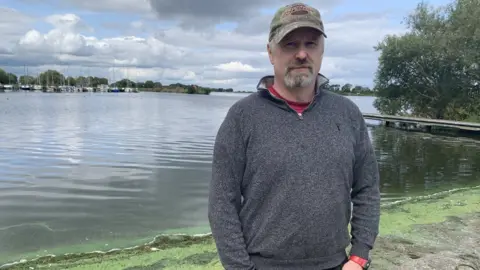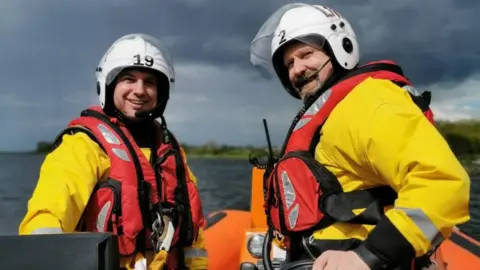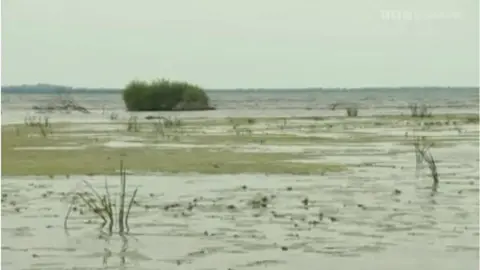Lough Neagh: Toxic algae impeding search and rescue efforts
 BBC
BBCToxic algae and blocked waterways could be preventing life-saving efforts on the UK's largest inland body of water.
A volunteer search and rescue agency on Lough Neagh said it was having to weigh up the safety of its team before deploying them into potentially dangerous water.
No one was taking responsibility for dredging silt and clearing possibly poisonous algae from the lough, said volunteer Manus Lappin.
That was putting lives at risk.
"In a rescue scenario, were we to go in and somebody's in the water, we're putting our own crew in serious danger. They can get very sick, " Mr Lappin told the BBC's Evening Extra Programme.
"I myself have suffered from blue green algae poisoning a number of weeks ago and it's not pleasant.
"We think long and hard about putting any crew member into the water.
'It just needs to be dredged'
Northern Ireland's waterways have been badly affected by potentially toxic blue green algae during the summer months.
The search and rescue agency also raised concerns about access to areas of the Lough due to blocked waterways which they say need to be dredged - in particular, access to the River Blackwater.
"The Barmouth is the entrance to the Blackwater [river]. It's totally silted over, you can't get access," said Mr Lappin.
"There's a little slipway called the Maghery Canal and that's now silted over. It's silt and rocks, it just needs to be dredged."

Rescuers are forced to slow "to a snail's pace" when navigating those areas, said Mr Lappin, adding that nobody was taking ownership or responsibility for Lough Neagh.
"We have navigational markers, which tell people danger areas - they've all fallen down, they're all broken," he said.
"A lot of our callouts are people running aground on places they shouldn't be because there's no hazard warning."
Ownership of and responsibility for Lough Neagh is the responsibility of no single department or group.
The Earl of Shaftesbury is said to own the banks and bed of the lough, but not the water itself.
Mr Lappin wants to see a multi-agency response to his concerns.
"The problem is, it [responsibility] falls between the various councils around the Lough, the Department for Infrastructure, the Department for Agriculture and Environment and unfortunately none of them are standing up and taking responsibility," he said.
Risk to crew and lifeboat
"For us to go into the River Blackwater, we're risking a £250,000 lifeboat.
"More importantly, we're risking it being out of service if we run aground."

"We're having to give serious consideration to whether we want to risk our crew and our lifeboats going into these areas."
Lough Neagh Partnership, a stakeholder body representing fishermen, Lough Neagh Rescue and other groups, says it has been lobbying Armagh Banbridge and Craigavon and Mid Ulster Council along with the Department for Infrastructure for the past two years to get the mouth of the Blackwater River dredged.
A cross-council dredging group for the mouth was set up and met in June 2022 but to date no studies or work has been carried out.
The group wrote to the previous Department for Infrastructure Minister Nicola Mallon on four occasions to visit the area, but a visit didn't take place.
It says the DFI has indicated it is not the department's responsibility to dredge the Blackwater.
Lough Neagh Partnership Strategic Manager Gerry Darby said: "DFI have been informed by the Marine Coastguard Agency after lobbying from the Lough Neagh Partnership and Lough Neagh Rescue that Lough Neagh and Blackwater River is unsafe, but they continue to ignore the needs of the Lough and the people of Lough Neagh.
"An integrated interdepartmental structure is urgently needed for the Lough to address environmental and safety needs."
The DFI said removal of silt for navigation purposes did not fall within its remit.
In a statement it said that, as the drainage authority for Northern Ireland, it had responsibility for maintaining the capacity of designated watercourses to allow for the free flow of water for drainage and flood prevention purposes.
"Regular inspections are undertaken at the mouth of the River Blackwater (from the footbridge adjacent to Maghery County Park to where it enters Lough Neagh) to ensure water is free flowing.
"Removal of silt at this location for navigation purposes does not fall within the remit of the Department."
BBC News NI has also asked Daera for a response.
'They pass the buck'
SDLP Councillor for Mid Ulster Malachy Quinn has called for a taskforce to be set up to tackle a number of issues on the Lough before a "major disaster" happened.
"What we have here is the greatest natural resource in the UK and Ireland and we are standing by and letting it go to ruin" said Mr Quinn.
"There are too many statutory bodies that are not taking responsibility
"We're talking DfI, we have Daera, the local councils, the Lough Neagh Partnership but they have very limited responsibility and the Earl of Shaftsbury who owns the bed of Lough Neagh.
"All them together, anytime you go to one they pass the buck."
"The buck has been passed that many times the Lough is seriously suffering."
"We need everybody with responsibility for the lough sitting around a table as part of a group and tackling these issues ASAP."
